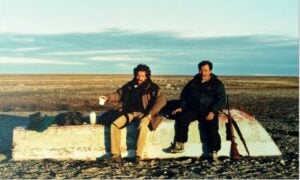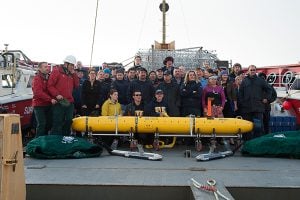
People & Culture
Kahkiihtwaam ee-pee-kiiweehtataahk: Bringing it back home again
The story of how a critically endangered Indigenous language can be saved
- 6310 words
- 26 minutes
This article is over 5 years old and may contain outdated information.
People & Culture

A new generation of King William Island residents has begun puzzling over clues from the doomed Franklin voyage after the Inuit oral historian Louie Kamookak took students on a four-day expedition to key sites on the island over the Labour Day weekend.
Last year, underwater archaeologists from Parks Canada discovered the wreck of Erebus, following information from the oral histories of Inuit who encountered Franklin’s desperate men, came across their corpses and over the years have stumbled upon their belongings.
Kamookak, 56, is the Inuit historian who gathered the histories and interpreted them, interviewing 20 elders over many years. In the wake of the Erebus find, he wanted students in this community to learn the value of oral history tradition, since they do not learn about it at school. He also wanted them to see historical sites for themselves. So, along with The Royal Canadian Geographical Society, he invited them on a modern expedition.
“There’s still a haunting, a mystery behind it from the stories that were passed down,” Kamookak says.
The Malerualik Expedition
Shaunya Ullulaq, 18, Michael Eleehetook, 16, James Takkiruq, 16, and Jade Kamookak, 12, (Louie’s daughter), visited the unmarked grave of what Inuit oral history says is a Franklin crew member on Todd Island. The grave is ringed with stones, with a dark stone facing north after the European tradition. Inuit of that era did not bury their dead.
The grave is so old that today, some of the bones lie exposed to the harsh Arctic elements, spotted with lichen. No official excavation or analysis of the site has ever been made, Kamookak told the students. None of the students had seen the grave before or heard about it.
The students also visited ancient stone huts carved into the banks of the island’s south shore centuries ago by the Tuniit, a people who arrived on the island before the Inuit, as well as the island’s first trading post and other burial sites spilling bleached bones onto the tundra’s hills. The elder Jimmy Qirqqut, 78, walked the land with them, explaining in Inuktitut the Inuit wisdom he had learned as a child.
The expedition was named Malerualik after the traditional hunting and fishing site about 88 kilometres along the coast from the island’s settlement, Gjoa Haven. That’s where the students camped in canvas tents, sleeping on the hides of musk oxen for warmth in the early September cold. The name means “the place where one could follow after caribou” in Inuktitut.
Kamookak is planning more expeditions to Franklin sites on the island in future years.
Sir John Franklin’s two ships, HMS Erebus and HMS Terror became trapped in the ice off the northwest tip of the island in 1846 while he and his 128 men were trying to find the Northwest Passage. Franklin and many others died in the first three years of the voyage, leaving 105 shipmates who eventually abandoned the vessels and marched across the polar desert in search of rescue. None survived.
Are you passionate about Canadian geography?
You can support Canadian Geographic in 3 ways:

People & Culture
The story of how a critically endangered Indigenous language can be saved

History
Arctic historian Ken McGoogan takes an in-depth, contemporary perspective on the legacy of Sir John Franklin, offering a new explanation of the famous Northern mystery

History
Why this summer’s search for the lost ships of the Franklin Expedition will be the biggest and most advanced ever

People & Culture
On April 12, Franklin enthusiasts had a rare opportunity to come together in the same room as The Royal Canadian Geographical Society presented their 2016 Can Geo Talks